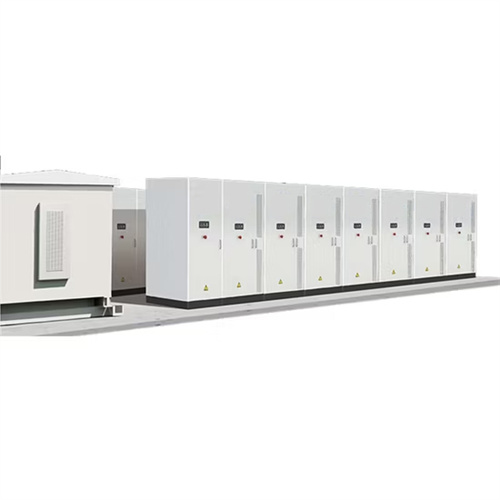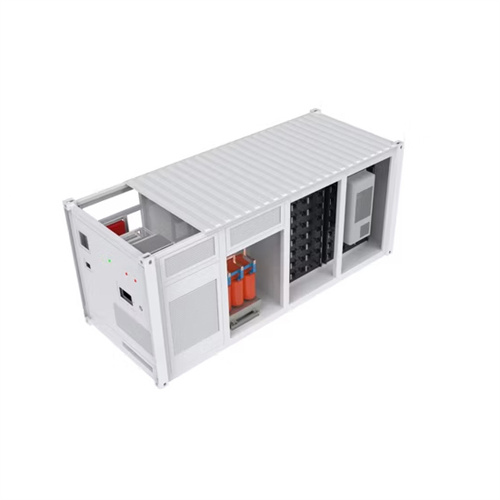PV 330 inverter size

330kW Three-Phase Inverter, Huawei SUN2000
The Huawei SUN2000-330KTL-H1 inverter is a three-phase device essential for any photovoltaic system, with a capacity of 330 kW, designed to transform direct current from solar panels into usable alternating current. This top-tier product

PV Inverter Market Size, Share & Industry Growth to 2030
The Global PV Inverter Market size is expected to reach $40.5 billion by 2030, rising at a market growth of 18.2% CAGR during the forecast period. In the year 2022, the market attained a

Optimize Your Solar Setup with Our Inverter Size
Our Inverter Size Calculator is designed to help you determine the appropriate size for your solar system''s inverter. This guide will take you through each step to ensure you get accurate and useful results.

How to Size an Inverter for a Solar System
Sizing a solar inverter correctly depends primarily on your PV system''s rated capacity and layout. However, several other variables must also be factored into the calculations. Here is the step-by-step process to determine

TerraMax™ utility-scale PV inverter 330kW
The SolarEdge TerraMax™ Inverter, paired with H1300 Power Optimizers, delivers up to 330kW of power, setting new standards for energy yields, module level visibility, and O&M savings. Efficiency DC Oversizing

How To Size an Inverter: Solar Inverter Sizing Explained
Choose an inverter size that''s at least 20% larger than the total calculated wattage. Identify the largest power draws in your RV to accurately size the inverter for your specific needs. Installation and Wiring Considerations.

Huawei SmartDesign Configurator: designs and sizes
The Huawei SUN2000 M5 three-phase string inverter was created to maximize energy yields in residential and commercial PV systems. 2 MPPT (two inputs each) RS485, Optional: Ethernet, WiFi, 4G; IP66 protection

Choosing the Right Inverter Size for Your Solar PV Installation:
The inverter size plays a crucial role in how efficiently your solar PV system operates. It must be matched to the size of your solar array to maximize energy production and

How Many Solar Panels Are You Allowed on Your
Because string inverters are often undersized to as much as 120% of the inverter rating, you can still in theory install up to around 4.4kWp of panels to this inverter size (depending how good the inverter is!), but the

Solar PV Inverter Sizing | Complete Guide
By considering factors such as system size, energy consumption, future expansion plans, local climate, and solar irradiance levels, you can select the appropriate inverter size for your installation. Understanding derating factors,

What Size Solar Inverter Do You Need for Solar
Inverter Size (watts) = Solar Panel Rating (watts) / Inverter Efficiency (%) For example, if you have a 6 kW (6,000 watts) solar array and the inverter efficiency is 96%, you would need an inverter with a capacity of at

Calculating Solar PV String Size – A Step-By-Step Guide
Calculating Solar PV String Size – A Step-By-Step Guide One aspect of designing a solar PV system that is often confusing, is calculating how many solar panels you can connect in series

PV Inverter Market Trends, Size, Share & Analysis 2024
The PV inverter market size is valued at US$ 15.28 billion by 2024, from US$ 41.87 billion in 2031, at a CAGR of 15.5% during the forecast period. PV inverters are critical components in solar

Solar inverter sizing: Choose the right size inverter
As the name suggests, they are smaller than the typical solar power inverter, coming in at about the size of a WiFi router. Microinverters are usually placed under each solar panel, in a ratio of

Solar System Sizing Tool & Calculator – TheSunPays
The following tool is intended to assist users to calculate a size of an entry-level solar system for home use, which includes the solar panels, inverter, batteries and user load. Inverter

Choosing an inverter for a utility-scale solar farm
It does not consume energy from the PV array to do it (with the exception of some small inverter losses) but it does consume capacity of the inverter hardware. Before finalising the size of any solar inverter, it is important to fully understand

6 FAQs about [PV 330 inverter size]
How many string inverters are in a 30 kW solar PV system?
Sizing calculations Using three 12.6 kW string inverters in this 30 kW commercial solar PV system allows for modular expansion later. The inverters are perfectly sized at 1.25 times the array’s capacity. Improperly sizing the solar inverter can undermine the purpose of investing in an expensive PV system.
What is a solar inverter size calculator?
Calculates the ideal continuous power rating for your inverter (in Watts). Recommends an inverter size based on the greater of continuous or surge power requirements (in Watts). Our Inverter Size Calculator is designed to help you determine the appropriate size for your solar system’s inverter.
What is inverter sizing?
The process of inverter sizing involves understanding the relationship between DC (Direct Current) from the solar panels and AC (Alternating Current) required for powering appliances. The Inverter Sizing Formula is – AC Inverter Capacity (kW) = DC Input Power (kW) / Inverter Efficiency (%)
Why are inverters sized lower than kWp?
Inverter sizes are expressed in kW which is normally sized lower than the kWp of an array. This is because inverters are more efficient when working at their maximum power and most of the time the array is not at peak power. Using software like PV Sol takes in to account variations in different solar panels and local weather conditions.
What are the different types of solar inverters?
There are several types of solar inverters available in the market, each with its own unique characteristics and sizing considerations. The most common types include string inverters, microinverters, and power optimizers. String inverters are the most commonly used type of inverter in residential and commercial solar installations.
What size solar inverter should I use?
While It’s generally not recommended to use an inverter that is significantly larger than the solar array’s capacity, a slight oversizing (e.g., using a DC-to-AC ratio of 1.2) can be beneficial. This approach can help reduce clipping losses and allow for future expansion of the solar array.
Related Contents
- Thailand pv inverter battery storage
- Dominica vintech pv inverter
- Grid tied pv inverter Venezuela
- Solar PV Inverter Screen
- PV Inverter Expectations
- PV inverter cut-off switch
- Household PV Inverter Market
- France Solar PV Inverter
- Huawei PV Inverter 50HZ Range
- Sunny Solar PV Panel Size
- Global PV Inverter Manufacturers Ranking
- Cosda PV inverter inventory